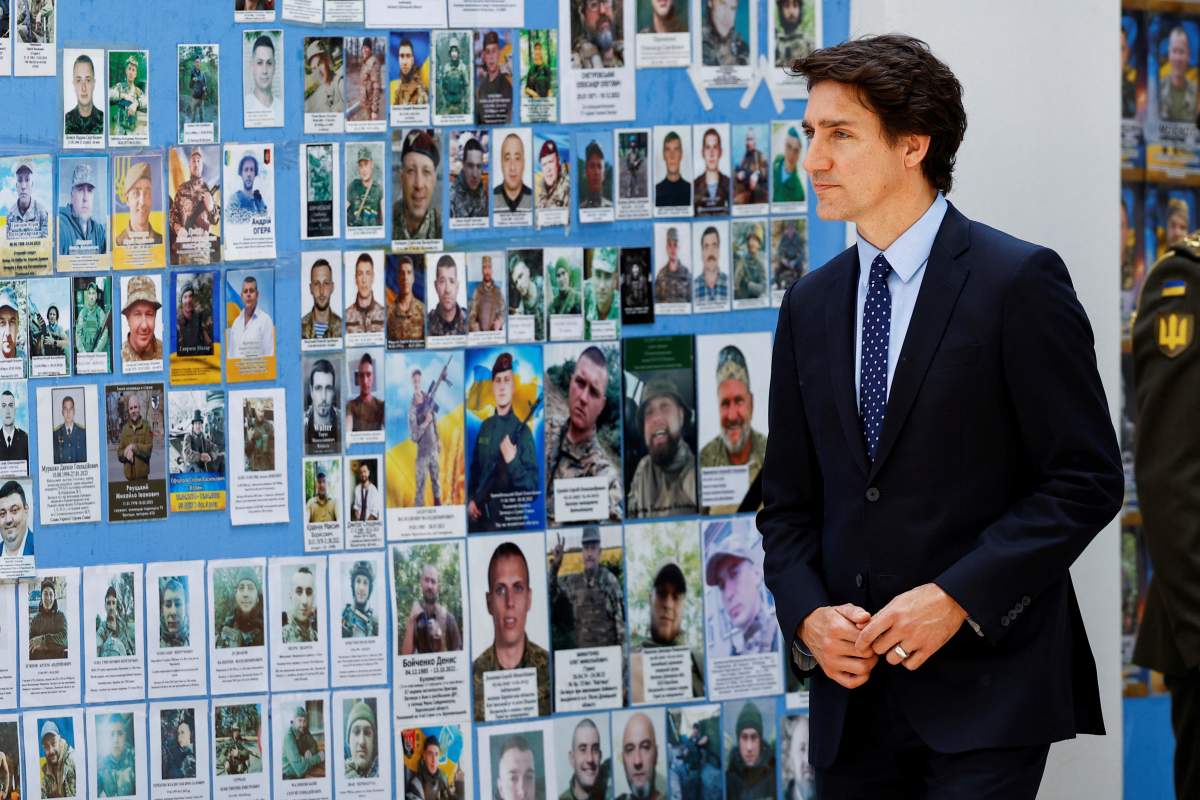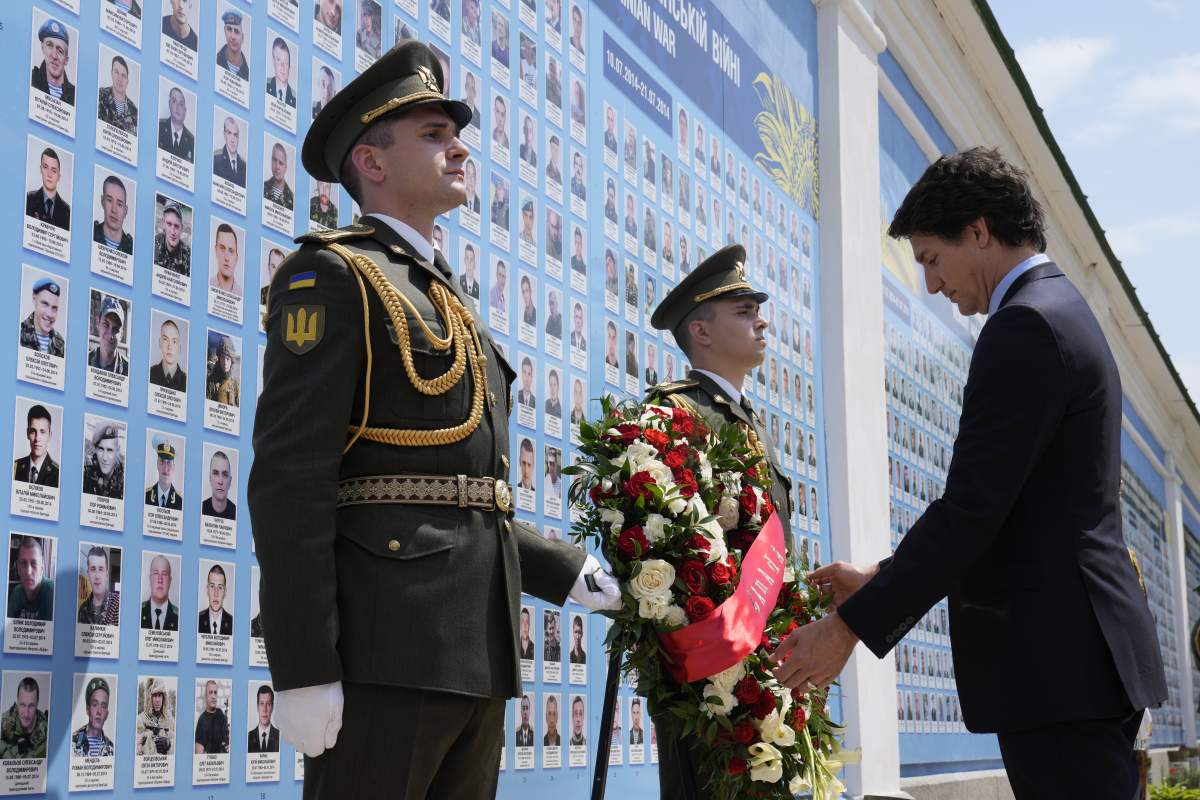Prime Minister Justin Trudeau says Canada is committing another $500 million to help Ukraine’s military fight back against Russia’s invasion, including by sending more weapons.

Trudeau made the announcement during an unannounced visit to Kyiv to show Canada’s support for the fight against Russia, and told the country’s parliament they are in a battle for “the future of us all.”
“You are the tip of the spear that is determining the future of the 21st century,” Trudeau said during a 25-minute speech before a special session of the national legislature, known as the Verkhovna Rada.

Pledging more weapons and fighter-pilot training for Ukraine, Trudeau also told the lawmakers that Canada will support their country’s bid for membership in the NATO military alliance.
“We want peace on Ukrainian terms,” he said. “Russia must completely and unconditionally withdraw all its military forces from Ukraine.”
Deputy Prime Minister Chrystia Freeland is with him on the trip, which began with a wreath-laying at a memorial wall to honour Ukrainians who have died while defending their homeland.
This is the second time Trudeau has made an unannounced visit to the embattled country since Russia began its large-scale invasion of Ukraine in February 2022.

Trudeau last travelled to Ukraine just over a year ago, where he reopened the Canadian Embassy in Kyiv and met Zelenskyy in person for the first time since the war began.
Trudeau and Zelenskyy also spent some time together just last month on the margins of the G7 summit in Hiroshima, Japan, where the Ukrainian president continued his campaign to shore up support among western allies for the defence of his country.
Some media outlets, including The Canadian Press, were made aware of today’s trip ahead of time on the condition that it not be reported until it was made public, for security reasons.
As of early Saturday morning, the Prime Minister’s Office had not published its usual itinerary for Trudeau’s day.
Earlier Saturday, Britain’s defence ministry reported “significant Ukrainian operations” in the country’s east and south since Thursday morning, with gains in some areas.

Get breaking National news
The ministry reported mixed results from the Russian army, with some units holding ground “while others have pulled back in some disorder, amid increased reports of Russian casualties as they withdraw through their own minefields.”
The ministry also noted “unusually active” Russian airstrikes in southern Ukraine, where it is easier for Moscow to fly planes.
Trudeau's visit follows major dam collapse
Earlier this week, a hydroelectric dam on the Dnieper River ruptured, flooding a large part of the front line in southern Ukraine and worsening the humanitarian situation — including the need for drinking water — in an area that was already undergoing shelling.
It remains unclear how the dam collapse happened. Kyiv has accused Russia of blowing up the dam and its hydropower plant, which Russian forces controlled. Moscow said Ukraine did it.
Trudeau and Zelenskyy also spent some time together just last month on the margins of the G7 summit in Hiroshima, Japan, where the Ukrainian president continued his campaign to shore up support among western allies for the defence of his country.
Canada has joined other countries in condemning Russian President Vladimir Putin’s regime for the incursion, including through economic sanctions.

Ottawa has also contributed more than $8 billion to efforts related to the war in Ukraine since last year. That included launching a special immigration program to allow Ukrainians to come to Canada quickly with a temporary work and study permit, instead of going through the usual refugee system.
It also gave some $1 billion in military support, including the donation of eight Leopard 2 main battle tanks to support the Armed Forces of Ukraine.
Ukrainian Prime Minister Denys Shmyhal visited Toronto in April, when Trudeau announced that Canada would provide assistance in the form of thousands of assault rifles, dozens of machine-guns and millions of rounds of ammunition to help the Ukrainian military fight Russian invaders.
At the time, Shmyhal thanked Canada for its support but also stressed the need for more.

Asked at the conclusion of the G7 summit in Hiroshima on May 21 what else Canada could do to help, Trudeau said: “We’re certainly not opposed to help in all sorts of different ways.”
Days later, Defence Minister Anita Anand announced a team of Canadian Armed Forces medical trainers helping instruct Ukrainian personnel in Poland would increase from seven to 12, and that Ottawa would donate 43 short-range missiles to Ukraine.
Canada has also recently joined Latvia in delivering training to Ukrainian soldiers being promoted to junior military officers, building on a program that focuses on teaching battlefield tactics.
During the G7 summit last month, Trudeau stressed that countries pushing for a negotiated ceasefire must recognize Russia is to blame for the conflict and could end things by stopping its invasion.
“It is not a ceasefire that is needed. It is peace. And that peace can only be achieved if Russia decides to stop its ongoing invasion of a sovereign neighbour,” the prime minister said.
The House of Commons foreign affairs committee took a similar view after its February visit to the region.
“The strategic consequences of allowing Russia to benefit from its aggression would far exceed the monetary costs associated with supporting Ukraine,” reads the committee’s April report.
“A frozen conflict would leave Ukraine facing constant threats and blackmail.”










Comments
Want to discuss? Please read our Commenting Policy first.